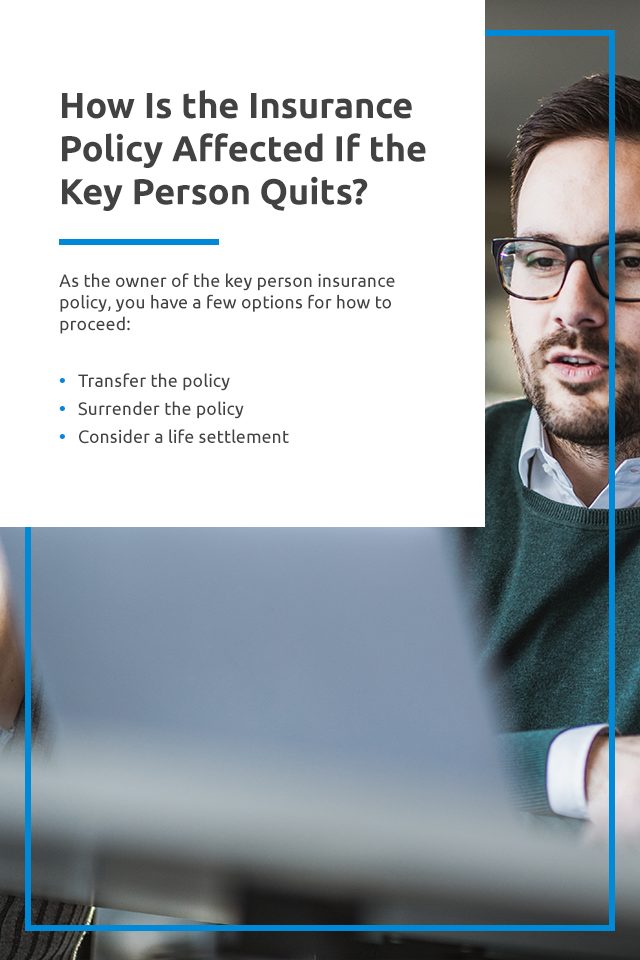
Key man or key person life insurance exists to protect your business if an important individual passes away or is seriously injured. A life insurance policy helps to protect your family financially if something happens to you. If you’re a business owner, your family members aren’t the only people who depend on you.
Key person insurance is essentially a combination of life insurance and business insurance. Think of it as life insurance that fulfills a special need in a business. Your company wouldn’t be the same without you, your business partner or a top employee, and the financial consequences of losing a key person can be significant. Key person insurance provides a death benefit to your business after the loss of a key person or key employee.

Similarly to individual life insurance, key person life insurance can be purchased as a permanent or term policy:
Regardless of the type of policy, there are three main roles associated with key person insurance:
In many cases, a business functions as both the owner and the beneficiary in a key man policy. The individual who is insured typically does not participate in the policy, but a company is required to notify and get written permission from the insured individual before they purchase a policy.
Small business insurance may not be enough to protect your business if a key employee passes away. Obtaining key person insurance makes sense in several circumstances:
To obtain a key person insurance policy for someone, you’ll need to provide proof that the individual plays a critical role in your business. This employee should have substantial responsibilities or a special skill set that allows them to make a significant contribution to your business’s profits. In most cases, your company will not be able to purchase key man insurance if your profits are declining. Loss-making companies also cannot purchase key person insurance.
Key person death benefits allow your business to move forward and recover from a loss by:
Even if you intend to close your business after the death of a key person, obtaining key person insurance is still necessary. The money you receive from your insurance policy can be used to cover severance pay for your employees, investor payoffs and closing costs. Obtaining key person insurance means you’ll be protecting your company in the present and the future.
If you’re planning to purchase a key person insurance policy, you may also want to know about policy options and taxes related to key man insurance.
A standard key man life insurance policy covers a person if they pass away during the policy’s specified time period. There are two other types of key man insurance that do not involve the death of the key person:
Your choice of policy will depend on what you believe your company needs and what makes sense for your key person.
A key person insurance policy is not tax-deductible, which means policy owners must pay the insurance premiums with after-tax dollars. An exception to this situation is if an employee is the policy beneficiary and the insurance premiums are considered part of their taxable income — though this isn’t common with key man insurance.
According to the IRS, you can deduct interest on debts up to $50,000 for a key person through a life insurance policy. You cannot, however, deduct the cost of the life insurance policy for you or any employee. Though the premiums are not tax-deductible, the death benefit is typically tax-free. If your key man passes away, the beneficiary would receive the death benefit without income tax requirements. For C corporations, the death benefit would be included in the alternative minimum tax (AMT) they owe.
Businesses with key man insurance should include information about their coverage in their corporate tax return. This may include details about the amount of coverage, the number of employees insured and documentation of each insured employee’s written consent for the policy.
If an insured employee voluntarily leaves, it’s beneficial to have a plan for what you’ll do with your key person policy. As the owner of the key person insurance policy, you have a few options for how to proceed:

It’s worth noting that having a key man insurance policy may encourage your valuable workers to remain with your business. Your policy clearly communicates the value you see in a key person. If a key person is considering leaving but knows you have insurance, they may be more likely to trust you and negotiate an agreement for improvements that motivate them to stay.
Though there is no exact formula to calculate the amount of coverage you need, you can begin by considering the key person’s financial contribution to your business. If your key employee died, what would the financial impacts be on your company?
Are you a sole proprietor? If so, you may want to purchase key person insurance for yourself and obtain enough coverage to both cover your business’s debts and assist your heirs with closing your company.
Small businesses are generally the most at risk when it comes to the loss of key employees. If you are the sole owner, your company could likely close its doors permanently if you die. If you are in business with a partner, the same may be true if your partner passes away. Even a top-performing employee may be crucial enough to your business that your company won’t be able to recover from their loss. These irreplaceable staff members are the ones for whom you should purchase a key person insurance policy.
If you are in business alone and you don’t have any employees, consider if your current life insurance policy would be enough to protect your family in the event of your death. If not, you may want to consider obtaining additional coverage so that your family can sustain their lifestyle after the loss of your business income.
A larger business that has diversified into a few different fields should purchase key person insurance on key staff members. This will ensure that each employee and venture is protected. Banks, for example, employ staff members who are vital to the institution because of the position they hold and their expertise and years of experience in the financial industry.
If you’re obtaining key person insurance for a top employee, you may want to purchase enough insurance to cover the income from that employee’s sales or to give your business a financial cushion during the search for a replacement.
Determining the monetary value of a person and their work can be difficult. You may be able to find accurate data for the amount of revenue your key man generates in a year, but other value is less clear. For example, some employees retain value in their network of connections or the way they attract high-performing employees to the company.

Your goal for a key man policy should be to make the impact of losing an employee as minimal as possible. Consider some of these factors to help you decide a coverage amount that fits your situation:
Keep in mind that many insurers will cap a key person policy at a multiple of your key employee’s income.
The cost of a key man insurance policy will depend on a few factors, including:
In addition to policy type and death benefit size, the health and lifestyle of the person you’re insuring will contribute to the policy cost. Relevant factors may include the key man’s occupation, family history and the following:
In some cases, the health and lifestyle of your key person can be a barrier to obtaining an inexpensive policy premium. For example, if you’re looking to insure an older employee or an employee with health problems, you may want to consider alternative options.
With more than 20 years of experience, David Pope Insurance Services, LLC can provide the key man life insurance you need. We strive for flexibility in the coverage we offer because we know each client has a unique situation and different needs. This commitment to adaptability is what has made us one of the most well-respected insurance providers in Missouri.
If you need insurance coverage, tell us about your situation and we’ll help you find the best solution. Do you have questions about key person insurance coverage in Missouri? Are you ready to purchase coverage for the key person in your business? Contact us at David Pope Insurance today.